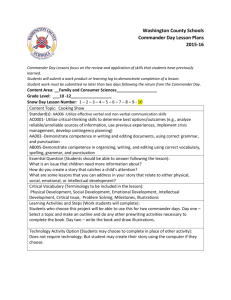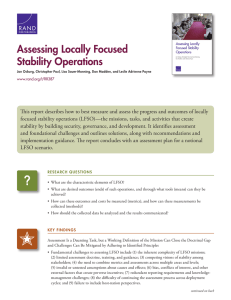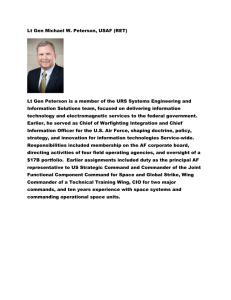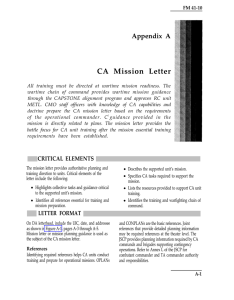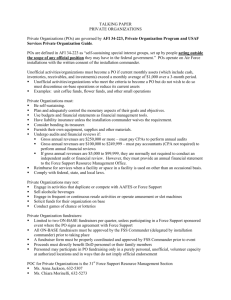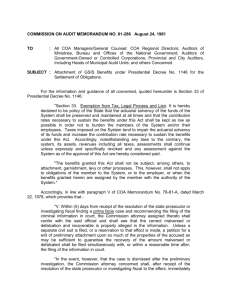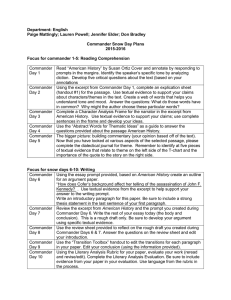Topic 17 CSGESG Planning inst ppt 14 Jul 08
advertisement
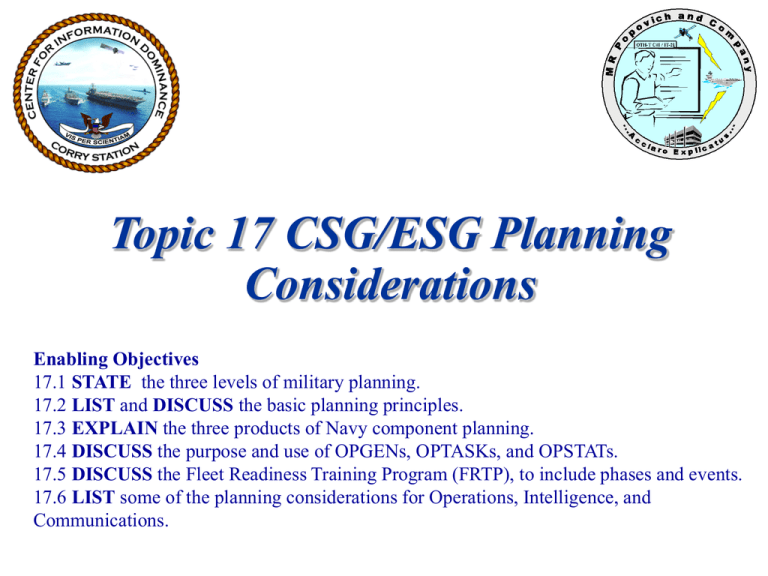
Topic 17 CSG/ESG Planning Considerations Enabling Objectives 17.1 STATE the three levels of military planning. 17.2 LIST and DISCUSS the basic planning principles. 17.3 EXPLAIN the three products of Navy component planning. 17.4 DISCUSS the purpose and use of OPGENs, OPTASKs, and OPSTATs. 17.5 DISCUSS the Fleet Readiness Training Program (FRTP), to include phases and events. 17.6 LIST some of the planning considerations for Operations, Intelligence, and Communications. Basics of Planning “There are three types of leaders: Those who make things happen, those who watch things happen, and those who wonder what happened.” American Military Saying Why We Plan • Fundamental To Leadership • Develop Planning Skills Military Planning • Levels of Planning – Strategic – Operational “Cryptologic-capable” – Tactical "A good plan violently executed NOW is better than a perfect plan executed next week....." --General George S. Patton War as I Knew It, 1947 Precepts of Planning • Principles of War – – – – – Objective Mass Maneuver Offensive Economy of Force • Cont’d – – – – Unity of Command Simplicity Surprise Security Planning Principles • • • • Relevance Clarity Timeliness Flexibility • Participation • Economy of Resources • Security • Coordination Military Planning Logic Mission Phase 1 Commander’s Estimate Course of Action Action Phase 2 Commander’s Plan Organization Tasks Phase 3 Commander’s Directive Order Phase 4 Commander’s Supervision Planning Responsibilities • • • • National Planning Joint Operational Planning Campaign Planning Naval Operations Planning National Planning National Security Council Joint Strategic Planning System Planning, Programming & Budgeting System Joint Operation Planning and Execution System Joint Operational Planning Campaign Planning Deliberate Planning OPLAN CONPLAN Functional Plan Crisis Action Planning Campaign Plan OPORD Campaign Planning "(A) lesson of the Persian Gulf conflict is the importance, in a highly uncertain world, of sound planning. . . .Our response in the crisis was greatly aided because we had planned for such a contingency." --Secretary of Defense Richard Cheney, 1991 Naval Component Planning • Commander’s Estimate • OPLANS • Directives Navy Coordination • OPGEN • OPTASK • • • • Air Defense Intel Communications Link • OPSTAT Exercising the Plan • • • • Contingency Operations Scheduled Deployments JTFEX COMPTUEX/ESGEX N3 Planning Considerations • • • • • • • Termination End State Objectives Effects Decisive Points Decision Points Direct v. Indirect Lines of Operations • • • • • • Timing and Tempo Forces and Functions Leverage Balance Synergy Culmination IO Planning Considerations • • • • • • Planning Initiation Mission Analysis COA Development COA Analysis and Wargaming COA Comparison COA Approval N2 Planning Considerations • Intelligence Requirements • Personnel, Augmentation, Logistics, Communications • Collection • Processing and Exploitation • Analysis and Production • I&W, Current Intel, GMI, Targeting, Scientific and Technical Intelligence • Evaluation and Feedback N6 Planning Considerations • Information Assurance • Multnational Communications • Support to ISR • Interagency, Intergovernmental, & Non-Governmental Communications • WWW/Internet • Information Management • Joint Network Communications Control • SATCOM Planning and Management • EM Spectrum Planning and Mgmt
